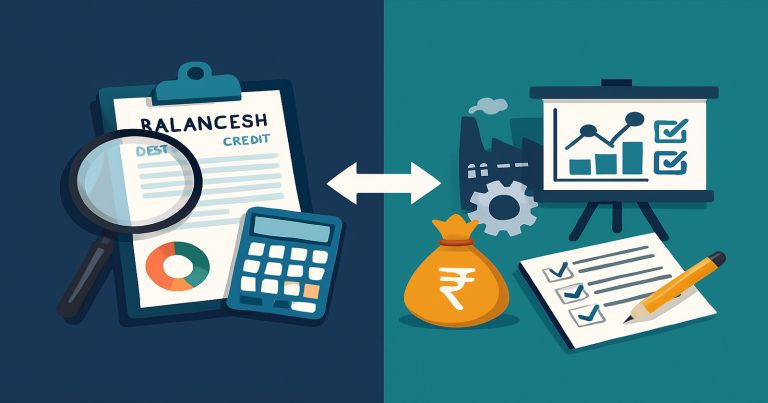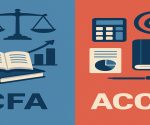Cost accounting and management accounting are two distinct but interrelated branches of accounting in business finance and strategy. Although their contributions to better decision-making internally involve designing different objectives and methodologies, the areas in this respective form include what cost accounting is mainly concerned with: determining the actual costs incurred through various activities and analysing input expenses related to products, operations, or processes. It enhances operational efficiency via reduced waste and better pricing strategies. By contrast, management accounting uses both this financial and non-financial information by managers to assist them in planning and forecasting and make decisions aligned with the organisation’s long-term objectives. These two accounting systems can create a complete internal control framework to optimise performance, reduce cost inefficiencies, and promote growth.
What is Cost Accounting?
Cost accounting is a specialised field of accounting that captures and analyzes the total cost involved in production or service delivery. It determines the unit cost of a product, project, or process. This type of accounting provides detailed cost data to support inventory valuation, product pricing, and cost control.
It includes the tracking of:
- Direct costs like raw materials and labour.
- Indirect costs, such as overheads or utilities.
Cost allocation to departments, processes, or activities.
Firms used to take cost sheets, standard costing, marginal costing, and variance analysis in cost accounting to ensure financial efficiency for each stage of the operation.
The Advantages of Cost Accounting
Cost accounting is mainly significant in organising and improving the internal efficiencies of organisations. It includes the following important benefits:
- Helps in Product Pricing: Cost accounting provides real unit costs, enabling businesses to set reasonable prices for profits and competition.
- Helps in Budgeting and Cost Control: This breakdown with analysis will expose unnecessary spending and allow organisations to reduce overhead expenses.
- Improves Inventory Valuation: Increases the flow of goods within the company’s boundaries while taking account of raw material in the work-in-progress and final products.
- Decision-Making at Operational Level: It clarifies cost-benefit scenarios, especially regarding short-term decisions like making or buying.
Limitations of Cost Accounting
Even though both accounting systems are highly beneficial, they come with specific limitations:
- Non-financial factors like customer satisfaction or market trends may be ignored.
- Often expensive and time-consuming to implement fully.
- Not always suitable for service sectors where cost determination is less precise.
What is Management Accounting?
Management Accounting (also known as managerial accounting) is the process of preparing internal financial reports that assist managers in strategic decision-making, budget formulation, forecasting, and performance evaluation. Unlike cost accounting, management accounting is forward-looking and not bound by accounting standards like financial accounting. It emphasises:
- Financial planning and forecasting
- Cost-benefit analysis
- KPI tracking and dashboards
- Business modeling
Its key objective is to ensure that management has accurate, relevant, and timely information to make sound business decisions in a dynamic environment.
Advantages of Management Accounting
Management accounting encompasses not only costs but also other strategic realms so that companies remain competitive for the long term:
- Support for Strategic Planning: Management accounting provides input regarding long-term opportunities such as market entry or diversification.
- Enhanced Forecasting and Budgeting: Using predictive models allows the organisation to look at multiple scenarios and adjust financial strategies accordingly.
- Accountability Across Departments: Tracking KPIs and performance measures ensures each business unit aligns with corporate objectives.
- Guide for Capital Investment Decisions: Assistance for significant investments with ROI, IRR, and NPV calculations.
Limitations of Management Accounting
- Heavily relies on estimates and assumptions that may not hold.
- No standardised framework; results may vary depending on methods used.
- It requires continuous updates and real-time data, increasing the administrative burden.
Key Differences Between Cost Accounting and Management Accounting
Cost accounting and management accounting are two essential accounting disciplines serving distinct purposes within an organisation. Though both find their utilisation within a firm, they contrast in terms of objectives, coverage, approaches, and utilisation. Let’s highlight these essential contrasts in an orderly manner.
Objective and Purpose
Cost accounting is primarily concerned with calculating, recording, and controlling costs incurred in production and operations. The principal aim of cost accounting is to assist business organisations in ascertaining the actual cost of goods or services and identifying means of optimally curtailing and controlling those costs.
Management accounting, on the other hand, is designed to assist internal management in making decisions. It seeks to furnish appropriate financial and non-financial information that helps in planning, forecasting, performance measurement, and strategic decision-making. It goes beyond cost information and encompasses a broad spectrum of financial information.
Scope and Nature
The field of cost accounting is comparatively limited because it primarily focuses on cost determination and control. It handles different costing techniques such as marginal, standard, and activity-based costing.
Management accounting, however, has a broader field. It handles budgeting, variance analysis, profitability analysis, risk management, and financial forecasting. It is analytical and assists management in resolving complex business issues.
Time Orientation
Cost accounting is primarily backward-looking, based on historical data used to calculate and analyze costs. It assists in determining how much has been expended and where expenses can be improved.
Management accounting, on the other hand, is forward-looking. It is concerned with future planning and forecasting to enable managers to make active decisions in line with business objectives.
Reporting and Format
Cost accounting reports adhere to standard formats and are frequently produced monthly, quarterly, or annually, based on organizational requirements and industry demands.
Management accounting reports are less standardised in format and timing. They are produced as and when required, customised to individual managerial needs, and frequently incorporate dashboards, forecasts, and what-if analysis.
Legal Requirement
Cost accounting is obligatory in some industries, like manufacturing, where cost records and cost audits are compulsory by law.
Management accounting, on the other hand, is not obliged by law. It is a purely internal function employed only to improve managerial decisions and is neither regulated by any statutory guidelines nor directives.
End Users
The main users of cost accounting are internal departments such as production, operations, and finance, who need detailed cost information for budget control and efficiency.
For management accounting, the end users are senior executives and decision-makers. They include top- and middle-level managers who utilize the insights to inform overall business strategy.
Integration with Other Accounting Systems
Cost accounting is frequently reconciled with the financial accounts to verify reported cost accuracy. Cost accounting is an interface between the detailed cost of operations and financial reporting.
Instead, management accounting extracts data from cost and financial accounting systems and pairs them with business intelligence to provide actionable management insight.
Here is a structured comparison of both types of accounting to help distinguish their core features:
| Aspect | Cost Accounting | Management Accounting |
| Primary Objective | To ascertain and control the costs of production or services | To assist in strategic planning and managerial decision-making |
| Focus | Past and present cost data | Present data with a future-oriented approach |
| Nature | Quantitative and operational | Both quantitative and qualitative, analytical |
| Scope | Narrow—focuses primarily on cost-related information | Broad—includes budgeting, forecasting, performance evaluation |
| Reporting Format | Formal, standardised (cost sheets, reports) | Flexible and customised reports or dashboards |
| Applicable To | Manufacturing and service industries for cost tracking | All industries for decision support and financial control |
| Users | Internal departments like production and accounts | Managers, executives, and strategic planners |
| Time Frame | Periodic—daily, monthly, quarterly | As needed—on-demand, weekly, monthly |
| Legal Requirement | Required in specific sectors (e.g., government tenders) | Not legally mandated |
| Dependency on Forecasts | Minimal; relies on actual cost data | High, depends on future projections and estimates |
| Techniques Used | Marginal costing, job costing, and standard costing | Budgetary control, ratio analysis, and financial modelling |
When Should a Business Use Cost Accounting or Management Accounting?
In modern financial management, understanding when to use cost accounting vs. management accounting is crucial. Each serves a different function and offers unique advantages depending on the business’s size, goals, and operational complexity.
When to Use Cost Accounting?
Cost accounting is best suited for manufacturing businesses, project-based industries, or organisations where tracking expenses related to materials, labour, and overhead is essential. Cost accounting provides the necessary tools if your company regularly evaluates cost per unit, production efficiency, or inventory valuation. For example, a textile company may use process costing to track the price of goods manufactured across different departments.
When to Use Management Accounting?
Management accounting is ideal for companies engaged in long-term strategic planning, scenario analysis, or performance evaluation. It’s used across all industries, including service and tech-based firms. For instance, a startup in the tech sector may rely on cash flow forecasts, break-even analysis, and financial modelling to guide investor presentations and scaling decisions. Management accounting is critical during mergers, budgeting cycles, or market entry planning.
Key Tools and Techniques Used in Cost and Management Accounting
The tools used in each accounting system help highlight how differently they operate and what kind of outputs they generate. Here’s a breakdown of the core accounting techniques employed in cost and management accounting.
Tools in Cost Accounting
- Standard Costing: Pre-determined cost benchmarks used for cost control.
- Marginal Costing: Helps in decision-making by analyzing variable costs and contribution margins.
- Job Costing: Applied when costs are attributed to individual jobs or batches (e.g., in printing or construction).
- Process Costing: Ideal for mass production environments like food processing or chemicals.
These tools focus on cost calculation, efficiency improvement, and inventory valuation.
Tools in Management Accounting
- Short-term and long-term financial planning is carried out using budgeting and forecasting.
- Ratio Analysis: Liquidity, profitability, and operational efficiency are revealed.
- Break-even Sales Volume: It helps ascertain the sales necessary to cover fixed and variable costs.
- Cash Flow Analysis: A forecast of the future inflow and outflow of cash to keep the liquidity intact.
Management gets data-based insights for better planning and control within and among departments.
Role of Cost and Management Accounting
Cost and management accounting go beyond registering historical financial data; they support strategic business growth and long-range planning. This is how they do it:
Cost Accounting and Its Strategic Role
In their strategic role, these arrangements facilitate production economies and cost controls for each product within the operation. Cost information aids in deciding which product is profitable, whether a process should be automated, or whether a product line should be terminated. With all these, decisions on pricing strategy and product portfolio are influenced, which are essential to the market’s competitiveness.
Management Accounting’s Strategic Role
Management accounting has a direct role in business modelling, scenario simulation, and investment appraisal, being work-forward by nature. It resolves management questions such as Should we expand internationally? Or what is our projected ROI for launching a new service? Net Present Value (NPV), Internal Rate of Return (IRR), and K-Discounted Cash Flow are other tools that are related to management accounting.
Cost Accounting Vs Management Accounting FAQs
1. How is cost accounting different from management accounting?
Cost accounting uses historical data to record and control production costs to improve operational efficiency. In contrast, management accounting provides insights using financial and non-financial information to support planning, forecasting, and strategic decision-making.
2. What are the duties of a management accountant?
A management accountant prepares budgets, performs financial analysis, forecasts trends, monitors performance metrics, and advises management on business decisions. Their role supports both short-term operations and long-term strategic goals.
3. What are the limitations of management accounting?
Management accounting relies on estimates, which may be inaccurate or biased. It lacks standardised formats, depends heavily on timely data, and may vary in quality depending on the methods or assumptions used.
4. What is the scope of cost accounting?
The scope of cost accounting includes determining production costs, budget preparation, inventory valuation, cost control, and cost reduction. It is primarily internal and supports pricing, cost audits, and efficiency improvements.
5. How do cost and management accounting complement each other?
Cost accounting provides detailed expense data that management accounting uses for broader financial analysis and strategic planning. They help businesses balance operational control with long-term growth strategies when used together.


